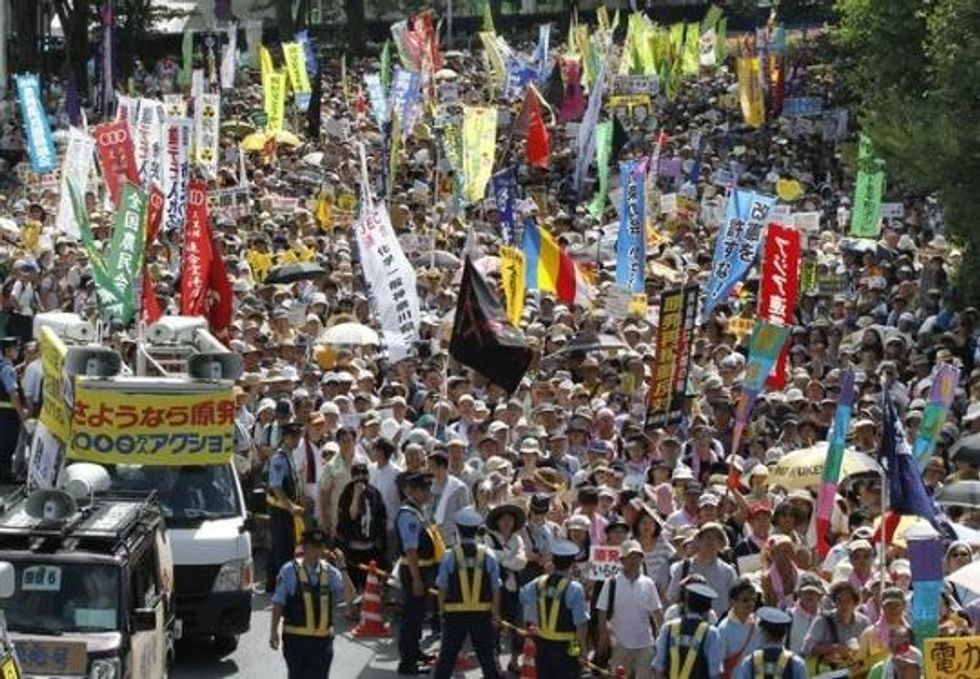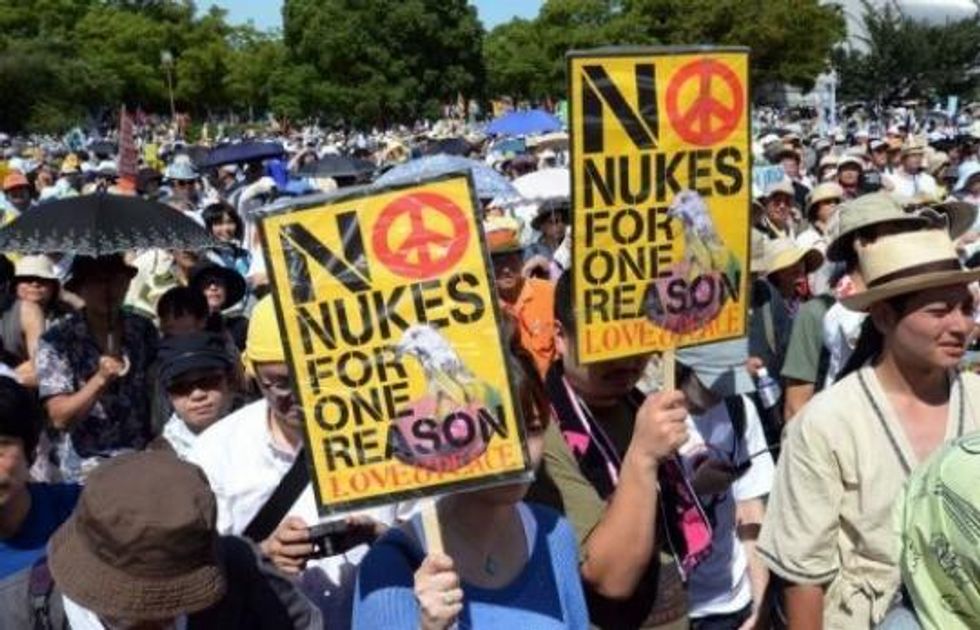

SUBSCRIBE TO OUR FREE NEWSLETTER
Daily news & progressive opinion—funded by the people, not the corporations—delivered straight to your inbox.
5
#000000
#FFFFFF
To donate by check, phone, or other method, see our More Ways to Give page.


Daily news & progressive opinion—funded by the people, not the corporations—delivered straight to your inbox.

Over 100,000 protesters took to the streets in central Tokyo on Monday to protest the country's return to nuclear power. The demonstration was one of the largest of its kind since Prime Minister Yoshihiko Noda announced that the country would restart its nuclear reactors last month.
Protest organizers estimated the crowd at 170,000 people. Demonstrators marched through the streets in Tokyo's record setting heat chanting: "Don't resume nuclear power operation. Prime Minister (Yoshihiko) Noda should quit."
"We are so angry because no progress has been made in terms of compensation and decontamination," said Noboru Shikatani, a 71-year-old man who evacuated Fukushima after the disaster.
Public anger over the handling of last year's Fukushima disaster has continued to swell. Earlier this month a damning report released by a parliamentary panel investigating the government's handling of the disaster found that plant owner TEPCO and government regulators intentionally ignored key warnings and preparations that should have been implemented before the tsunami. The subsequent nuclear disaster to follow was "clearly man-made," according to the panel.
"We can't accept any resumption of nuclear power operation as the Fukushima case has not been resolved at all," Shikatani added. "We want to bring our voice to many people by joining this kind of demonstration."
The last of the country's nuclear reactors had been shut down in May, following public pressure; however, the first reactor at the Oi plant in Fukui prefecture was restarted July 1, 2012 despite widespread criticism.
Noda now plans to eventually restart all 50 of Japan's reactors, a campaign that has seen large scale protests since its announcement.

Dear Common Dreams reader, The U.S. is on a fast track to authoritarianism like nothing I've ever seen. Meanwhile, corporate news outlets are utterly capitulating to Trump, twisting their coverage to avoid drawing his ire while lining up to stuff cash in his pockets. That's why I believe that Common Dreams is doing the best and most consequential reporting that we've ever done. Our small but mighty team is a progressive reporting powerhouse, covering the news every day that the corporate media never will. Our mission has always been simple: To inform. To inspire. And to ignite change for the common good. Now here's the key piece that I want all our readers to understand: None of this would be possible without your financial support. That's not just some fundraising cliche. It's the absolute and literal truth. We don't accept corporate advertising and never will. We don't have a paywall because we don't think people should be blocked from critical news based on their ability to pay. Everything we do is funded by the donations of readers like you. Will you donate now to help power the nonprofit, independent reporting of Common Dreams? Thank you for being a vital member of our community. Together, we can keep independent journalism alive when it’s needed most. - Craig Brown, Co-founder |

Over 100,000 protesters took to the streets in central Tokyo on Monday to protest the country's return to nuclear power. The demonstration was one of the largest of its kind since Prime Minister Yoshihiko Noda announced that the country would restart its nuclear reactors last month.
Protest organizers estimated the crowd at 170,000 people. Demonstrators marched through the streets in Tokyo's record setting heat chanting: "Don't resume nuclear power operation. Prime Minister (Yoshihiko) Noda should quit."
"We are so angry because no progress has been made in terms of compensation and decontamination," said Noboru Shikatani, a 71-year-old man who evacuated Fukushima after the disaster.
Public anger over the handling of last year's Fukushima disaster has continued to swell. Earlier this month a damning report released by a parliamentary panel investigating the government's handling of the disaster found that plant owner TEPCO and government regulators intentionally ignored key warnings and preparations that should have been implemented before the tsunami. The subsequent nuclear disaster to follow was "clearly man-made," according to the panel.
"We can't accept any resumption of nuclear power operation as the Fukushima case has not been resolved at all," Shikatani added. "We want to bring our voice to many people by joining this kind of demonstration."
The last of the country's nuclear reactors had been shut down in May, following public pressure; however, the first reactor at the Oi plant in Fukui prefecture was restarted July 1, 2012 despite widespread criticism.
Noda now plans to eventually restart all 50 of Japan's reactors, a campaign that has seen large scale protests since its announcement.


Over 100,000 protesters took to the streets in central Tokyo on Monday to protest the country's return to nuclear power. The demonstration was one of the largest of its kind since Prime Minister Yoshihiko Noda announced that the country would restart its nuclear reactors last month.
Protest organizers estimated the crowd at 170,000 people. Demonstrators marched through the streets in Tokyo's record setting heat chanting: "Don't resume nuclear power operation. Prime Minister (Yoshihiko) Noda should quit."
"We are so angry because no progress has been made in terms of compensation and decontamination," said Noboru Shikatani, a 71-year-old man who evacuated Fukushima after the disaster.
Public anger over the handling of last year's Fukushima disaster has continued to swell. Earlier this month a damning report released by a parliamentary panel investigating the government's handling of the disaster found that plant owner TEPCO and government regulators intentionally ignored key warnings and preparations that should have been implemented before the tsunami. The subsequent nuclear disaster to follow was "clearly man-made," according to the panel.
"We can't accept any resumption of nuclear power operation as the Fukushima case has not been resolved at all," Shikatani added. "We want to bring our voice to many people by joining this kind of demonstration."
The last of the country's nuclear reactors had been shut down in May, following public pressure; however, the first reactor at the Oi plant in Fukui prefecture was restarted July 1, 2012 despite widespread criticism.
Noda now plans to eventually restart all 50 of Japan's reactors, a campaign that has seen large scale protests since its announcement.
